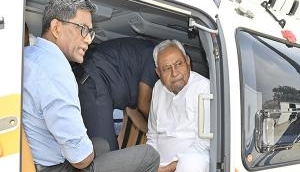The dead and their currency notes: The human cost of sudden demonetisation

There is a reason why Congress spokesperson Manish Tiwari's branding the sudden demonetisation move as a 'Tughlaqi' order does not sound entirely out of context.
Tiwari's comparison of Prime Minister Narendra Modi with Muhammad Bin Tughlaq, the 14th century monarch, is because of the latter's sudden decision to demonetise gold and silver coins and replace them with copper and brass ones.
Tughlaq's move, just like Modi's, was hailed as a bold one initially, but it soon turned into a major disaster.
Whether Modi's move will lead to significant benefits will emerge only with gradual passage of time, but one damaging impact is already clear - the lives of millions of poor have been sent into a tizzy.
They are confused about relevant facts and therefore unsure about the fate of their hard-earned savings.
Those with access to bank branches and ATMs are the relatively privileged ones and even they are spending hours in queues with only one thought - how to secure their hard-earned money.
But in the hinterland, where they are far away from bank branches and ATMs, this insecurity is fast turning into despondency - a sinking feeling that is making their hearts stop.
The saddest outcome of the shock demonetisation is what has been lost in the newspapers as just another fall-out story. At least four deaths have been reported so far from various corners of the country.
These were people whose heart probably skipped a beat only because of this precise worry - all my hard-earned money is gone.
The deaths have implications
The image of the dead-body of Tirtharaji Devi of Gorakhpur lying on the road outside a bank branch will make you squirm.
The middle-aged woman, who reportedly worked as a washerwoman, is lying dead and two thousand-rupee notes are lying in front of her, one of them lies between in the pages of her bank pass-book.
Some reports have suggested that she collapsed after getting a wrong sense from a tea-stall discussion outside the branch that all her money was as good as gone.
Try to step into her rubber slippers for a moment and gauge the shock of that prospect.
Why did Tirtharaji Devi die? Some will say she died because of ignorance. But don't millions in the country with meagre sources of income live exactly like her?
Saving and saving some more with a million hopes and dreams and far away from the information overload that we in the cities live with. Government schemes designed to benefit them do not enter into their lives without the help of an aanganwaadi worker.
How are they supposed to understand all nuances of a sudden measure, like this one, that came into force within four hours of announcement?
Suicide in Telangana
Kandukuri Vinoda, 55, hanged herself at her house in Shenagapauram on Wednesday while her husband and son were asleep.
Her family had sold their 12-acre agricultural land a few days ago to arrange for the treatment of Vinoda's ailing husband. They had earned Rs 56.40 lakh from the sale and after spending Rs 1.4 lakh from it, had kept the remaining cash at home, all in Rs 1,000 and Rs 500 denominations.
They were was planning to buy agricultural land but the demonetisation announcement came all of a sudden and Vinoda committed suicide out of shock.
Two others collapsed and died in Mumbai and Kerala waiting in queue to exchange their old currency notes.
These deaths have implications. More than the misery being experienced by those who have been running from one bank branch to another, from ATM to ATM, and standing for hours in queues, these deaths are the result of the government's sudden, almost Tughlaq-like announcement.
The onus of their death, as of all the chaos, is on the government's shoulders. What has given it the right to play with lives in this manner?
In shock, even if alive
Those poor, the ones who did not die nor committ suicide, are still in shock. They have seen and heard reports of cash being burnt and they are bewildered at that prospect.
They are saying why didn't the rich distribute all that cash that they burnt among poor? They are sure that they would have found out away to convince somebody to exchange the notes for them.
Won't that image of burning cash stay with a poor man/woman forever? What a cruel joke is being played upon them. What a haunting human tragedy!
And all this is taking place in the name of action against black money. What action really? Many are happy that some privately held unaccounted cash may come out.
But many cash hoarders converted all their unaccounted money into gold and dollars, just the day after the prime minister's announcement.
Gold prices doubled in one day, indicating heavy sales. Did this harm the black economy in any way?
As for discouraging high value currency notes, not only will the Rs 500 and Rs 1000 notes be back, a new high denomination note of Rs 2000 has been added to the currency flow. Won't all of this further facilitate the black economy?
A temporary cash clean up is all that this exercise has amounted to - it is not a "war on black money". And what are the costs? The shock deaths? The suicides?
Apart from the Rs 20,000 crore cost of demonitisation, untold human misery has been let loose. The government as well as all of us will do well to contemplate what has been the actual cost of this entire exercise.
First published: 12 November 2016, 5:31 IST





![BJP's Kapil Mishra recreates Shankar Mahadevan’s ‘Breathless’ song to highlight Delhi pollution [WATCH] BJP's Kapil Mishra recreates Shankar Mahadevan’s ‘Breathless’ song to highlight Delhi pollution [WATCH]](https://images.catchnews.com/upload/2022/11/03/kapil-mishra_240884_300x172.png)

![Anupam Kher shares pictures of his toned body on 67th birthday [MUST SEE] Anupam Kher shares pictures of his toned body on 67th birthday [MUST SEE]](https://images.catchnews.com/upload/2022/03/07/Anupam_kher_231145_300x172.jpg)






